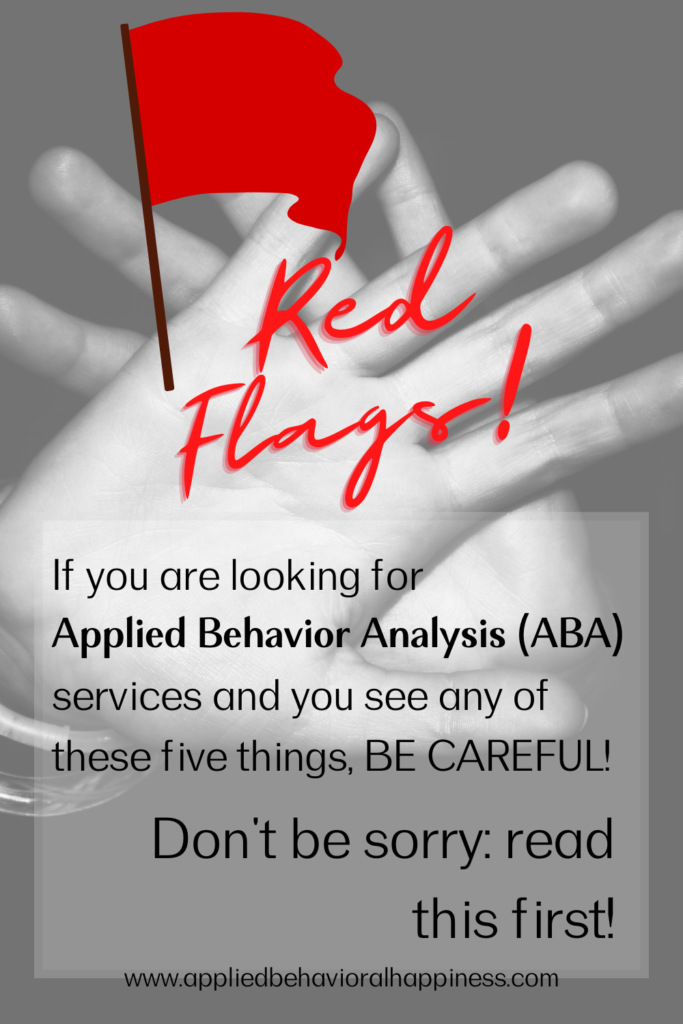Let’s talk about ABA red flags. Many families are afraid to seek out applied behavior analysis (ABA) services, and they have every right to be: there is a ton of media, anecdotes, and information in the world about the ways that ABA therapy has caused trauma or harmed people.
Listening to autistic voices on all sides of the debate can help you figure out what is best for you and your family, what to watch out for, and who you can trust. As a provider of ABA services, I want to extend some helpful tips as well.
Where can i find autistic voices to listen to on the topic of ABA and aba red flags?
If you are uncertain where to find autistic voices, I suggest you start where you likely already are: social media. There are a ton of accounts, hashtags, and groups that you can listen in to and learn lots of information from. Do know that being within certain groups can be exhausting as some groups can be focused more on proving one person is right and one is wrong instead of having constructive and nuanced conversations.
If you join a space and feel more confused and exhausted then informed, try another space.
What are 5 aba red flags according to a BCBA?
If you are considering ABA therapy for yourself or your child, there are a few things that I consider to be ABA red flags within the field. Here are five of them:
Red flag #1: Sorry mom and dad, you can’t come in
When you are looking for any service to support you and your family, aim for high transparency. If you can’t meet all of the staff, join a session with your child, review every program before it’s implemented, or have everything fully explained whenever you want more explanation, that’s a serious ABA red flag.
Red flag #2: Hello new staff…and another new staff…and another new staff…
When you start talking with a company, see if you can figure out what their turnover rate is for both board certified behavior analysts (BCBAs, the people who write the programs and supervise) and registered behavior technicians (RBTs, the people who do most of the direct work with kids).
You can do this by asking the company or talking to others who are getting services from them (How many different staff have you worked with? How often do staff change?)
Companies who care for their people will have less turnover, more consistent services, and usually higher quality services. One of the biggest complaints parents have in ABA is that turnover and inconsistency hurts them and their child, thus this is a big ABA red flag.

Red flag #3: *crickets*
Sometimes companies get ahead of themselves and push forward into services.. .and then suddenly go radio silent. This can be because they are waiting on an authorization for services (for ABA you usually need to pre-authorize a number of hours to begin services), they suddenly don’t have enough staff (usually due to turnover, see #2 above), or they have systems that aren’t functional and they lost track of you. Any of the above is a potential ABA red flag.
Red flag #4: The reviews are all onions and rotten tomatoes
If a number of people that have interacted with the company (staff and families served) have had a bad experience, that may be an ABA red flag. It is totally normal for some people to be dissatisfied with services: that is life. We all have different needs and some companies are a better fit than others. If most of the people you talk to (that have worked directly with the company) say stay away, you may want to think twice.
Red flag #5: Hmmm…bad vibes.
If you walk in and don’t feel comfortable, walk out. If you feel like you’re being sold on something, that it’s too good to be true, or that the “vibes” are just off, trust yourself and see what other options may be available. You don’t need a reason to feel an ABA red flag in your gut: just trust it and move on.
Conclusion
Finding good ABA services can be hard for everyone but is particularly hard for those most on the margins: rural families, families living with multiple conditions, families under high socioeconomic pressure… there are so many things that can make finding good services even more difficult.
As well, ABA is not a good fit for everyone, and it can take time to find exactly what you need from a company that fits your values and truly gets you.
Know that you can reach out and schedule a free discovery call at any time to discuss what’s going on and get advice on how to move forward. You can also join our membership Empathetic Behavior Change to get weekly access to group coaching and get all of your pressing questions answered. We are here to help, reach out any time.
Do you want to be added to our free resources list? We send out tips, tricks, and resources every Wednesday!
